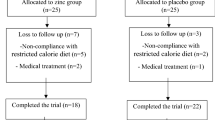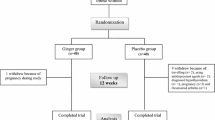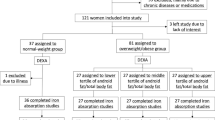Abstract
Obesity is a chronic inflammatory state characterized by altered adipokine production and increased levels of inflammatory cytokines. The study explored the effect of zinc supplementation on inflammatory markers and adipocyte hormones in young obese women. Twenty five non-obese women and forty obese women (body mass index ≥25 kg/m2) aged 19–28 years were recruited for this study. Twenty obese women of the study group took 30 mg/day of supplemental zinc as zinc gluconate for 8 weeks and 20 obese women of control group took placebo. Usual dietary zinc intake was estimated from 3-day diet records. Serum zinc and urinary zinc concentration were measured by Atomic Absorption Spectrophotometry. Inflammatory markers such as high sensitivity C-reactive protein (hs-CRP), tumor necrosis factor-alpha (TNF-α), and interleukin (IL)-6 and adipocyte hormones such as lepin and adiponectin were measured by enzyme immunoassay. Inflammatory markers and leptin were significantly higher, but adiponectin was significantly lower in obese women than non-obese women. Zinc supplementation increased serum zinc by 15 % and urinary zinc by 56 % (P < 0.05). The levels of hs-CRP (P = 0.03) and IL-6 (P = 0.006) significantly decreased with zinc supplementation, but not in placebo group. Serum leptin and plasma adiponectin concentration did not differ with either zinc supplementation or placebo. The levels of IL-6 and leptin were inversely associated with dietary zinc intake. These results suggest that zinc may have a favorable effect on obesity-related inflammation in young adults.
Similar content being viewed by others
Abbreviations
- BMI:
-
Body mass index
- SOD:
-
Superoxide dismutase
- hs-CRP:
-
High sensitivity C-reactive protein
- TNF-α:
-
Tumor necrosis factor-alpha
- IL-6:
-
Interleukin-6
References
Hotamisligil GS (2006) Inflammation and metabolic disorders. Nature 444(7121):860–867
Idriss HT, Naismith JH (2000) TNF alpha and the TNF receptor superfamily: structure–function relationship(s). Microsc Res Tech 50(3):184–195
Marreiro DN, Geloneze B, Tambascia MA, Lerario AC, Halpern A, Cozzolino SM (2006) Effect of zinc supplementation on serum leptin levels and insulin resistance of obese women. Biol Trace Elem Res 112(2):109–118
Tungtrongchitr R, Pongpaew P, Phonrat B, Tungtrongchitr A, Viroonudomphol D, Vudhivai N, Schelp FP (2003) Serum copper, zinc, ceruloplasmin and superoxide dismutase in Thai overweight and obese. J Med Assoc Thai 86(6):543–551
Gaetke LM, McClain CJ, Talwalkar RT, Shedlofsky SI (1997) Effects of endotoxin on zinc metabolism in human volunteers. Am J Physiol 272(6 Pt 1):E952–E956
Bao B, Prasad AS, Beck FW, Fitzgerald JT, Snell D, Bao GW, Singh T, Cardozo LJ (2010) Zinc decreases C-reactive protein, lipid peroxidation, and inflammatory cytokines in elderly subjects: a potential implication of zinc as an atheroprotective agent. Am J Clin Nutr 91(6):1634–1641
Ho E, Courtemanche C, Ames BN (2003) Zinc deficiency induces oxidative DNA damage and increases p53 expression in human lung fibroblasts. J Nutr 133(8):2543–2548
Prasad AS, Bao B, Beck FW, Kucuk O, Sarkar FH (2004) Antioxidant effect of zinc in humans. Free Radic Biol Med 37(8):1182–1190
Prasad AS, Beck FW, Bao B, Fitzgerald JT, Snell DC, Steinberg JD, Cardozo LJ (2007) Zinc supplementation decreases incidence of infections in the elderly: effect of zinc on generation of cytokines and oxidative stress. Am J Clin Nutr 85(3):837–844
Shankar AH, Prasad AS (1998) Zinc and immune function: the biological basis of altered resistance to infection. Am J Clin Nutr 68(2 Suppl):447S–463S
Kelishadi R, Hashemipour M, Adeli K, Tavakoli N, Movahedian-Attar A, Shapouri J, Poursafa P, Rouzbahani A (2010) Effect of zinc supplementation on markers of insulin resistance, oxidative stress, and inflammation among prepubescent children with metabolic syndrome. Metab Syndr Relat Disord 8(6):505–510
Korean Nutrition Society (2005) Dietary reference intake for Koreans. Kookjin Press, Seoul
Kim J, Jo I (2010) Relationship between body mass index and alanine aminotransferase concentration in non-diabetic Korean adults. Eur J Clin Nutr 64(2):169–175
Kim J, Paik HY, Joung H, Woodhouse LR, Li S, King JC (2004) Zinc supplementation reduces fractional zinc absorption in young and elderly Korean women. J Am Coll Nutr 23(4):309–315
Meret S, Henkin RI (1971) Simultaneous direct estimation by atomic absorption spectrophotometry of copper and zinc in serum, urine, and cerebrospinal fluid. Clin Chem 17(5):369–373
Koenig W, Lowel H, Baumert J, Meisinger C (2004) C-reactive protein modulates risk prediction based on the Framingham Score: implications for future risk assessment: results from a large cohort study in southern Germany. Circulation 109(11):1349–1353
Murakami M, Hibi M, Nakagawa N, Nakagawa T, Yasukawa K, Yamanishi K, Taga T, Kishimoto T (1993) IL-6-induced homodimerization of gp130 and associated activation of a tyrosine kinase. Science 260(5115):1808–1810
Ozata M, Mergen M, Oktenli C, Aydin A, Sanisoglu SY, Bolu E, Yilmaz MI, Sayal A, Isimer A, Ozdemir IC (2002) Increased oxidative stress and hypozincemia in male obesity. Clin Biochem 35(8):627–631
Costarelli L, Muti E, Malavolta M, Cipriano C, Giacconi R, Tesei S, Piacenza F, Pierpaoli S, Gasparini N, Faloia E, Tirabassi G, Boscaro M, Polito A, Mauro B, Maiani F, Raguzzini A, Marcellini F, Giuli C, Papa R, Emanuelli M, Lattanzio F, Mocchegiani E (2010) Distinctive modulation of inflammatory and metabolic parameters in relation to zinc nutritional status in adult overweight/obese subjects. J Nutr Biochem 21(5):432–437
De Martin R, Hoeth M, Hofer-Warbinek R, Schmid JA (2000) The transcription factor NF-kappa B and the regulation of vascular cell function. Arterioscler Thromb Vasc Biol 20(11):E83–E88
Bao S, Liu MJ, Lee B, Besecker B, Lai JP, Guttridge DC, Knoell DL (2010) Zinc modulates the innate immune response in vivo to polymicrobial sepsis through regulation of NF-kappaB. Am J Physiol Lung Cell Mol Physiol 298(6):L744–L754
Prasad AS, Bao B, Beck FW, Sarkar FH (2006) Correction of interleukin-2 gene expression by in vitro zinc addition to mononuclear cells from zinc-deficient human subjects: a specific test for zinc deficiency in humans. Transl Res 148(6):325–333
Marreiro DN, Fisberg M, Cozzolino SM (2004) Zinc nutritional status and its relationships with hyperinsulinemia in obese children and adolescents. Biol Trace Elem Res 100(2):137–149
Foster M, Samman S (2012) Zinc and regulation of inflammatory cytokines: implications for cardiometabolic disease. Nutrients 4(7):676–694
Noh H (2013) The relationship among zinc nutritional status, αENaC A663T gene polymorphism and salty taste acuity in Korean young adults. Seoul National University, Seoul
Acknowledgment
This research was supported by the Basic Science Research Program of the National Research Foundation of Korea (NRF) founded by the Ministry of Education, Science and Technology (NRF2012R1A1A1012317).
Conflict of interest
None of the authors has a conflict of interest.
Author information
Authors and Affiliations
Corresponding author
Rights and permissions
About this article
Cite this article
Kim, J., Ahn, J. Effect of Zinc Supplementation on Inflammatory Markers and Adipokines in Young Obese Women. Biol Trace Elem Res 157, 101–106 (2014). https://doi.org/10.1007/s12011-013-9885-3
Received:
Accepted:
Published:
Issue Date:
DOI: https://doi.org/10.1007/s12011-013-9885-3




